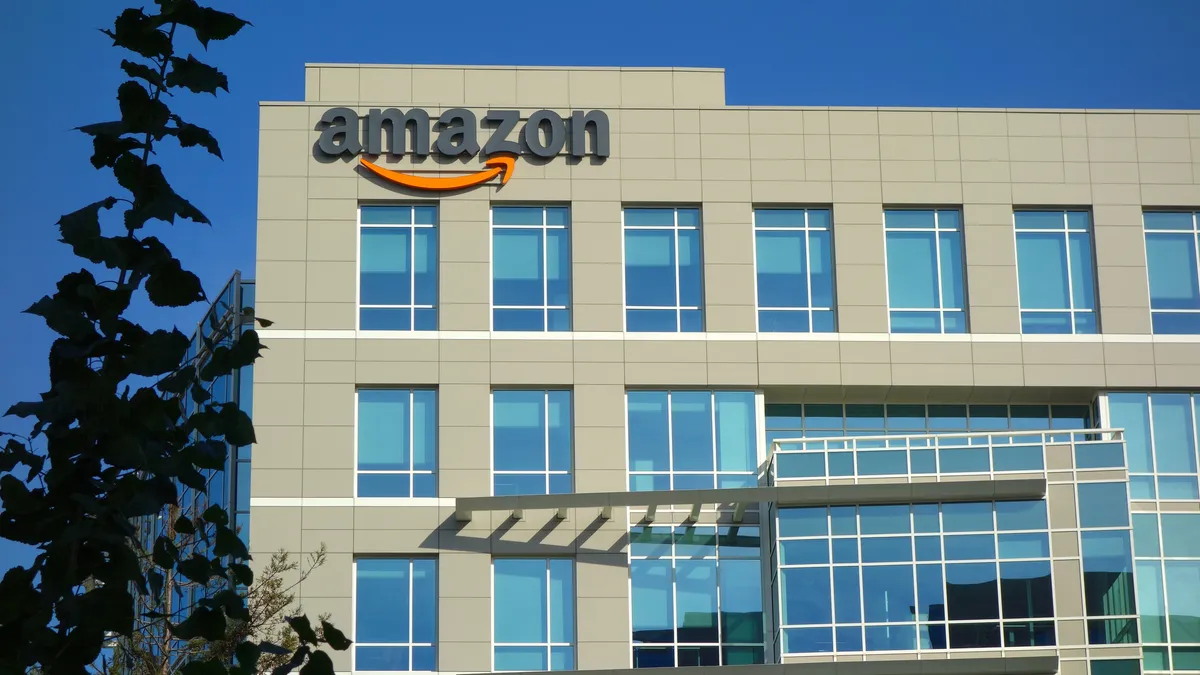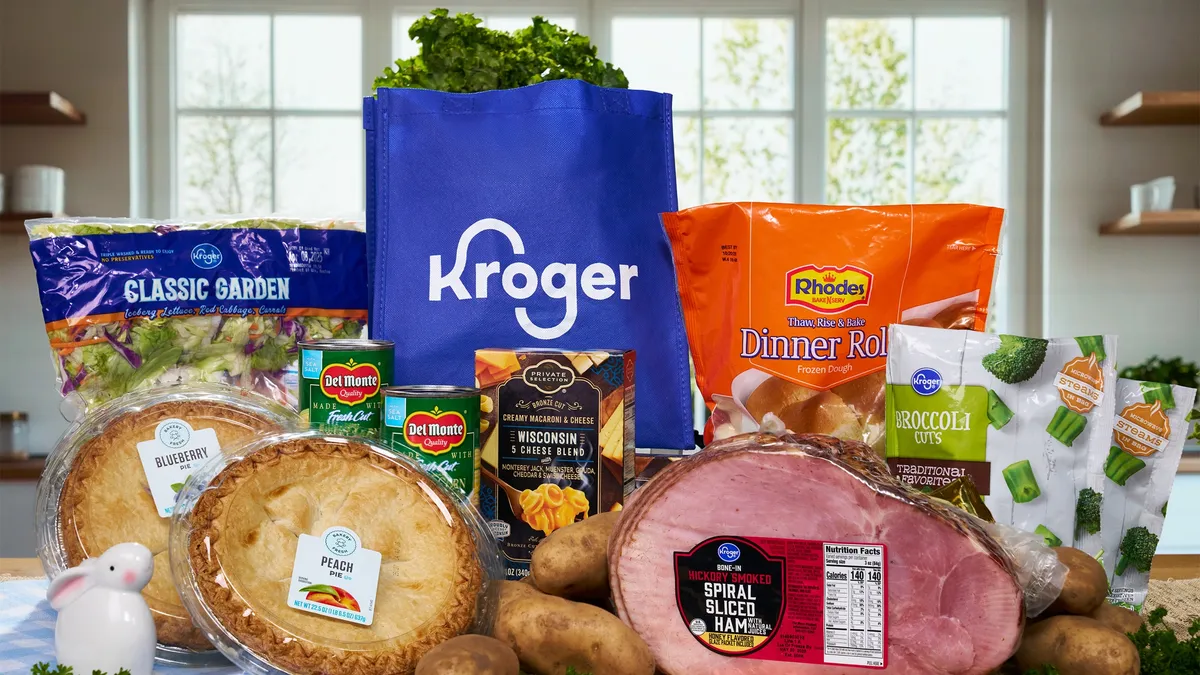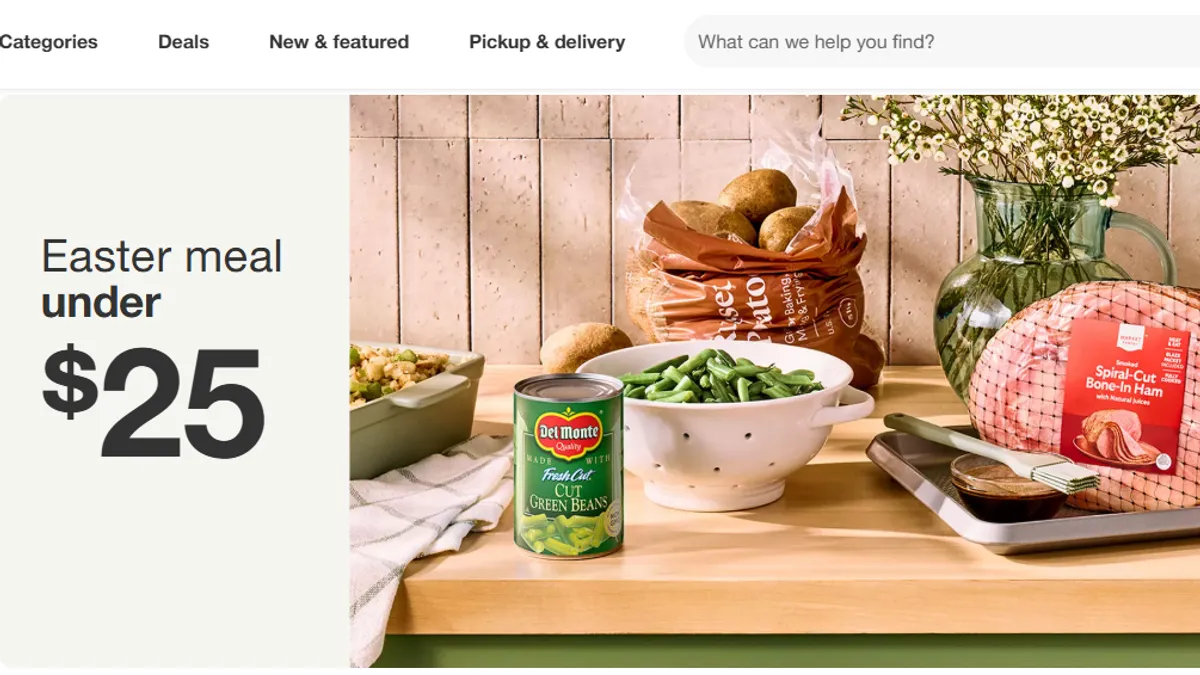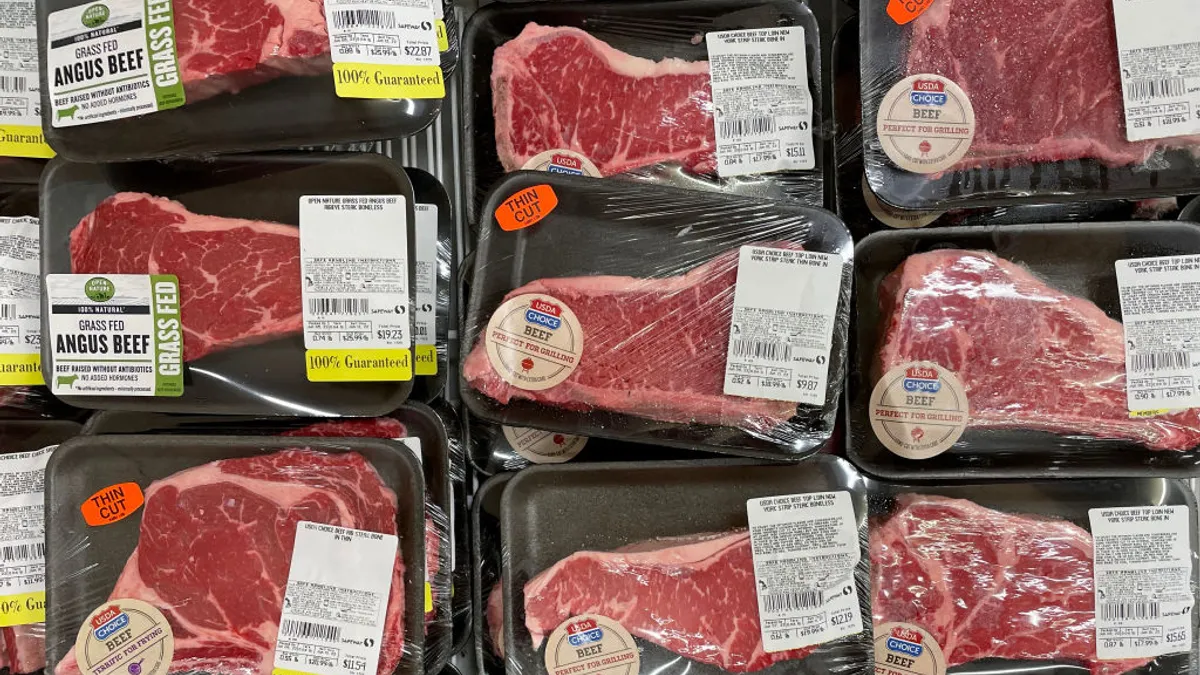Pardon the Disruption is a column from Grocery Dive that looks at the forces shaping food retail.
Here’s a riddle: What does Amazon’s rollout of private label milk late last month have to do with news that it’s building a brand-new grocery chain?
The answer could be: everything.
The Happy Belly milk release marked Amazon’s first venture into the liquid staple (not including Whole Foods’ brand milk) and was accompanied by an assortment of other dairy standbys, including half-and-half and whipping cream. The product descriptions name-check a few brands like Darigold and Reddi Wip in their appeal to get shoppers to make the switch. “If you like Lactaid,” the description for Happy Belly Lactose-Free Milk reads, “we invite you to try Happy Belly.”
That Amazon would take aim at major brands, which after all form the bedrock of its business, isn’t surprising. For a little more than a decade, the e-tailer has been ramping up its assortment of private label offerings across a multitude of categories. What started with batteries, headphones and bedding has now expanded into apparel, electronics, home goods and even home furnishings.
Amazon's private label offerings are accelerating. The company currently has 137 own brands, according to TJI Research, many of which were released over the past two to three years. CNN reported sales topped $7.5 billion last year, citing data from analysts at SunTrust Robinson. By 2022, Amazon's private label sales are expected to soar to $25 billion.
Until recently, grocery hasn’t been along for the ride. Although Amazon accounts for nearly 30% of online grocery spending, food and beverage products comprise less than 2% of Amazon's private label offerings, Coresight Research noted in a report issued in 2018. Solimo brand coffee pods, which launched last year, are top performers among house brands, according to Edge by Ascential. But other offerings have had only middling success, according to the firm, and primarily serve as pantry fill-ins for customers.
But Amazon’s grocery game is quickly evolving, and so is its private label strategy in food and beverage. The web giant now aims to capture frequent, full-basket shopping trips and all the fresh produce, meat, cereal and juicy consumer data that come with them.
Amazon got a private label infusion when it acquired Whole Foods in 2017, and since then it has offered the specialty grocer’s 365 Everyday brand on its website. As Danny Silverman, chief marketing officer at Edge by Ascential, told me, Whole Foods’ products only reach a narrow slice of Amazon’s consumer base.
What the e-tailer wants, he said, is to reach more mainstream, value-conscious shoppers that frequent conventional grocers and discount chains such as Walmart. And that, he said, is where Happy Belly milk comes in.
“Milk is as basic as it gets,” Silverman told me. “What might follow are the bread and the eggs to get to that core basket and start to penetrate the shopper’s wallet for those core shopping trips.”
He continued: "As they look to make this mainstream grocery play, they’re going to want those anchor brands and products as well. To me, it’s the precursor to that big push into becoming more of a mainstream grocer."
Happy Belly certainly seems to be building out that core shopping trip. In addition to milk, which retails for $3.29 for a 64-ounce carton, along with the aforementioned dairy products, the line offers cartons of cage-free white and brown eggs for $2.99 each. In October, according to TJI research, Amazon launched 24 selections of Happy Belly cheese covering several varieties in block, shredded and sliced form.
Silverman also pointed out that Amazon has been laying a grocery foundation in consumables like paper towels and toilet paper under its Presto brand. Mama Bear brand diapers and baby wipes, he noted, are two of its hottest exclusively owned products right now.
Building out these core grocery brands could help revitalize AmazonFresh, which launched more than a decade ago and slowly expanded to major cities across the U.S. before pulling back from several markets in late 2017. Subscribing to the $15-a-month service is currently the only way shoppers can get their hands on Happy Belly’s newest perishable items.
But Amazon is undoubtedly thinking bigger than Fresh with its private label push. Happy Belly, Solimo and other brands under development could eventually line the shelves at the new grocery chain the company is reportedly planning as part of its multi-format approach to the $800 billion industry. As The Wall Street Journal first reported, the yet-to-be named stores will be around 35,000-square feet and target prime real estate in cities across the country.
Mainstream store brands would help Amazon push down prices, something it's struggled to do at Whole Foods stores. Moreover, there’s reason to believe the new chain will become private label heavy over time, Silverman said — resembling an Aldi or a Trader Joe’s more than a Kroger or Albertsons.
“Amazon’s not going to try to replicate existing grocery models,” Silverman explained. “Those are low-margin, difficult businesses to run. I’m sure Amazon has no interest in just creating a me-too proposition.”
There’s ample evidence Amazon is gearing up for a big store brand grocery push across formats. According to TJI Research, Amazon has listed several management-level job openings, including a senior category manager, senior product marketing manager and senior program manager with responsibilities in developing private label food and consumables.
"Amazon has no interest in just creating a me-too proposition.”

Danny Silverman
Chief marketing officer, Edge by Ascential
Justin Smith, who runs TJI Research, also pointed out that Amazon last fall named a veteran of discount chains Lidl and Save-A-Lot as its head of real estate. Patrick Waldron worked for the German chain for nearly four years before moving to Save-A-Lot in 2017 as its vice president of real estate and business development.
“With Amazon hiring a former Save-A-Lot exec as its new head of real estate, I wouldn't be surprised to see a new physical grocery effort from Amazon that is quite deeply integrated with private label food and beverage efforts,” Smith told me in an email.
Despite all its resources, Amazon has an uphill battle on its hands in private label. An underwhelming assortment to date doesn’t bode well. It’s also making a push at a time when store brands are flourishing across competing retailers. Kroger’s brands recently crossed the 30% market share threshold, and its Simple Truth label now brings in more than $2.3 billion annually. Aldi’s brands are international award winners and Costco’s Kirkland is a juggernaut that brought in close to $40 billion last year.
And yet, this is Amazon — a company with more investment capital, data insight and institutional willpower than any other retailer. It will likely approach grocery private label development differently than a Kroger or an Aldi would, Silverman noted, focusing on its deep well of customer data rather than relying on manufacturer-led insights. It also has a unique ability to test products across online and in-store channels, discontinue what doesn’t work and scale what does.
Amazon’s own brands have scaled up and taken share across other retail categories. And now, the company is coming after grocery.
“House brands have become an essential strategy for Amazon,” Silverman said. “They will be a formidable competitor.”





















